China and US Agree to Fresh Trade Talks Amid Rare Earths Tensions
Key Takeaways:
- US and China agree to new trade talks following high-level call
- Rare earths export controls prompted US tariff threats
- G7 nations coordinating response to diversify supply chains
- Trump-Xi meeting confirmed for upcoming APEC summit
China and the United States have agreed to conduct another round of trade negotiations in the coming week, signaling efforts to prevent another damaging tariff escalation between the world’s two largest economies.
The breakthrough follows a Saturday morning video call between Chinese Vice Premier He Lifeng and US Treasury Secretary Scott Bessent, where both sides committed to in-person discussions.
High-Level Discussions Yield Progress
Chinese state media reported “candid, in-depth and constructive exchanges” during the call, with both parties agreeing to hold new trade talks “as soon as possible.” Bessent described the discussions as “frank and detailed” on social media, confirming they would meet “in-person next week to continue our discussions.”
US Trade Representative Jamieson Greer also participated in the call, according to Xinhua news agency.
Rare Earths Controls Spark Tensions
The diplomatic movement comes after Beijing announced sweeping controls on the critical rare earths industry last week, prompting President Trump to threaten 100% tariffs on Chinese imports in retaliation.
Bessent had previously accused China of seeking to harm other nations by tightening restrictions on rare earths, which are essential components in products ranging from smartphones to guided missiles.
Trump-Xi Meeting Confirmed
Hours before the call, Fox News released interview excerpts where Trump confirmed he would meet Chinese President Xi Jinping at the upcoming Asia-Pacific Economic Cooperation (APEC) summit in South Korea. This reverses his earlier threat to cancel the expected meeting.
G7 Coordinates Response
The high-level discussion occurred as Washington worked to rally Group of Seven finance ministers regarding China’s latest export controls.
European Union economy commissioner Valdis Dombrovskis revealed that G7 ministers have agreed to coordinate a short-term response and diversify suppliers. He noted that diversification could take years since the vast majority of rare earth supplies originate from China.
“We agreed, both bilaterally with the US and at the G7 level, to coordinate our approach,” Dombrovskis stated during IMF and World Bank fall meetings.
German Finance Minister Lars Klingbeil expressed hope that the Trump-Xi meeting could help resolve much of the US-China trade conflict, while clarifying that G7 nations “do not agree with China’s approach.”
Ongoing Trade War Context
The US-China trade war reignited this year when Trump promised sweeping tariffs on imports after returning to office. At its peak, tariffs reached triple-digit levels, effectively halting some trade as businesses awaited resolution.
While both countries have since reduced their respective levies, the truce has remained unstable. IMF chief Kristalina Georgieva recently expressed hope for an agreement to cool tensions between the economic powers.




